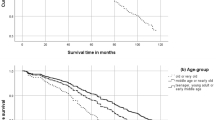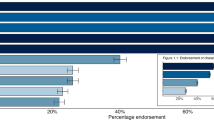Abstract
This research examined young adult men's and women's subjective perceptions of their age along several dimensions including how old they felt, looked, acted, desired to be, and thought they were regarded by others. The relationship between young adults' subjective age identities and other perceptions of the self were also examined. It was found that both men and women felt and believed that they acted and were regarded by others as older than their chronological age. On the other hand, same age identities were maintained along other age dimensions. Results also indicated that how old men and women thought they were regarded by others was strongly linked to how dominant, affiliative, confident, and socially potent they viewed themselves. Results are discussed within a life-span developmental framework which calls attention to the need for assessing the components and implications of younger as well as older adults' subjective age.
Similar content being viewed by others
References
Baltes, P. B., Reese, H. W., & Lipsitt, L. P. (1980). Life-span developmental psychology. Annual Review of Psychology, 13, 65–110.
Barak, B., & Stern, B. (1986). Subjective age correlates: A research note. Gerontologist, 26, 571–578.
Gough, H. G., & Heilbrun, A. B. (1983). The Adjective Check List (1983 ed). Consulting Psychological Press, Inc.
Kastenbaum, R., Derbin, V., Sabatini, P., & Artt, S. (1972). “The ages of me”: Toward personal and interpersonal definitions of functional age. International Journal of Aging and Human Development, 3, 197–212.
Linn, M. W., & Hunter, K. (1979). Perceptions of age in the elderly. Journal of Gerontology, 34, 46–52.
Markides, K. S., & Boldt, J. S. (1983). Change in subjective age among the elderly: A longitudinal analysis. The Gerontologist, 23, 46–52.
Montepare, J. M., & Fleet, J. (1987, August). Psychological implications of young men's and women's subjective age identities. Paper presented at the 95th Annual Meeting of the American Psychological Association, New York.
Montepare, J. M., & Lachman, M. (1989). “You're only as old as you feel”: Self-perceptions of age, fear of aging, and life satisfaction from adolescence to old age. Psychology and Aging 4, 73–78.
Mutran, E., & George, L. K. (1982). Alternative methods of measuring age identity: A research note. Social Forces, 60, 866–875.
Osteen, F. L., & Best, D. L. (1985, November). Components of subjective age identification among older adults. Paper presented at the 38th meeting of the Gerontological Society of America, New Orleans, LA.
Peters, G. R. (1979). Self-conceptions of the aged, age-identification, and aging. The Gerontologist, 11, 69–73.
Sontag, S. (1972). The double standard of aging. In A. R. Laurence, & D. T. Jaffe (Eds.), Readings in adult psychology: Contemporary perspectives. New York: Harper & Row.
Ward, R. W. (1984). The aging experience. New York: Harper & Row.
Author information
Authors and Affiliations
Rights and permissions
About this article
Cite this article
Montepare, J.M. Characteristics and psychological correlates of young adult men's and women's subjective age. Sex Roles 24, 323–333 (1991). https://doi.org/10.1007/BF00288305
Issue Date:
DOI: https://doi.org/10.1007/BF00288305




